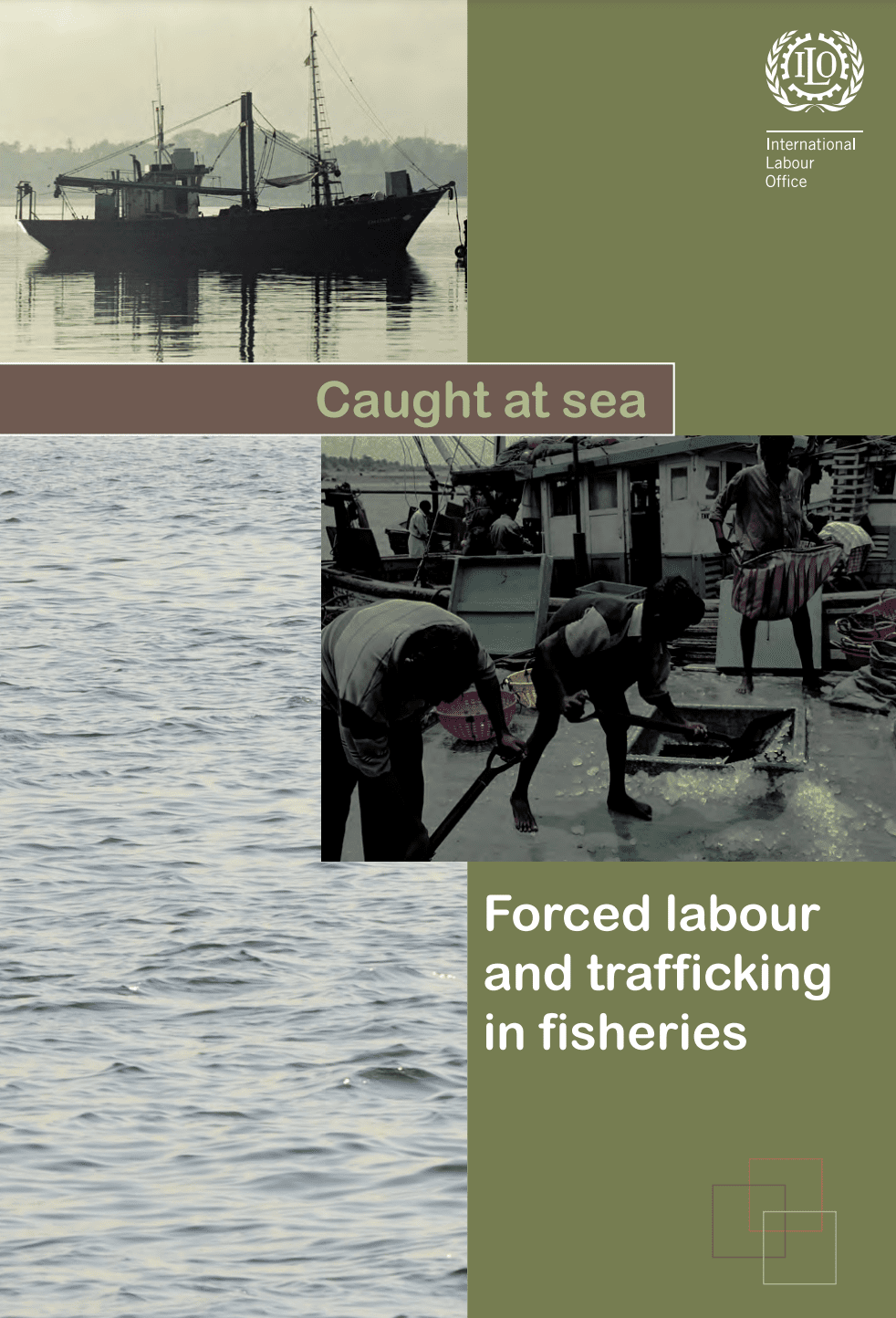
Caught at Sea: Forced Labour and Trafficking in Fisheries
Recent in-depth studies have described and analysed severe cases of forced labour and human trafficking in the fisheries sector. Whereas the fisheries sector counts among the most important economic sectors providing food security and employment worldwide, these studies reveal that, on board fishing vessels, fishers – many of them migrant workers – are subjected to extreme forms of human rights abuses, including forced labour and human trafficking.
This report examines recent literature on forced labour and human trafficking in the fisheries sector, with the focus on fishing vessels engaged in commercial marine fisheries. The report considers institutional and legal frameworks as well as multistakeholder initiatives that have the potential to impact fishers’ safety and working conditions.
Valuable input was received from the participants at an ILO consultation in Turin, Italy, in September 2012. The main questions answered in this report are: What do we know about forced labour and human trafficking in the fisheries sector (Chapter 1)? Which institutional and legal frameworks exist to combat this problem (Chapter 2)? Finally, what are the main issues that will inform our discussion on how to move forward (Conclusion)?
The literature surveyed for this report describes severe instances of labour abuse. Migrant workers in particular are too often deceived and coerced by brokers and recruitment agencies and forced to work on board vessels under the threat of force or by means of debt bondage. Victims describe illness, physical injury, psychological and sexual abuse, deaths, and their vulnerability on board vessels in remote locations of the sea for months and years at a time. Fishers are forced to work for long hours at very low pay, and the work is intense, hazardous and difficult. Capture fisheries have amongst the highest occupational fatality rates in the world.
Recent trends within the fisheries sector, including overfishing, illegal fishing and a shift in sourcing the workforce from developed to developing States mean that more relatively low cost migrant workers are employed by the fisheries sector. Lack of training, inadequate language skills and lack of enforcement of safety and labour standards make these fishers particularly vulnerable to forced labour and human trafficking. There are also strong indicators that forced labour and human trafficking in the fisheries sector are frequently linked to other forms of crime, such as transnational organized fisheries crime and corruption.
Most States, and consequently most flag States, have committed to criminalize and combat forced labour and human trafficking as members of the ILO, and ratifying parties to the ILO Forced Labour Convention or the United Nations Trafficking in Persons Protocol. At sea, flag States have primary responsibilty under international law to ensure compliance with international and national laws on board vessels flying their flag. Some States are however unable or unwilling to meet their flag State responsibilities. These act in breach of their obligations under international law, and may also act in breach of fundamental human rights instruments.
Forced labour and human trafficking can be combatted through improved regulation and control through implementation of safety and labour standards. ILO and the International Maritime Organization (IMO) have established a number of binding legal instruments that will improve fishers’ safety and working conditions (the ILO’s Work in Fishing Convention (No. 188), the IMO’s Torremolinos Protocol and the IMO’s Convention on Standards of Trading, Certification and Watchkeeping for Fishing Vessel Personnel (TCW-F), as well as non-binding recommendations and codes, some of which were developed jointly between ILO, the Food and Agriculture Organization (FAO) and IMO. With the exception of the STCW-F, as of March 2013 none of the binding legal instruments are in force. The slow pace of ratification of conventions inhibits effective flag and port State control of safety and labour standards in the fisheries sector, and undermines important opportunities to prevent and detect instances of forced labour and human trafficking on board fishing vessels. The absence of binding legal frameworks also contributes to a lack of transparency with respect to information on vessel identity, ownership and movement. This undermines effective investigation and prosecution of crimes committed on board fishing vessels. Forced labour and human trafficking in the fisheries sector are complex and multi-faceted problems. Tailor-made measures are required to effectively prevent and combat these crimes. While this report presents some useful entry points on the way forward, it also raises important questions that should be considered for further analysis and debate:
- How could flag States better exercise their authority and responsibility to enforce regulations over fisheries sector vessels registered under their flag?
- How to foster ratification and/or implementation of binding legal instruments ensuring fishers’ safety and decent working conditions?
- How to foster coordinated port State control over fishing vessels? • How to regulate and control private recruitment agencies so as to avoid situations where migrant workers are recruited to work on vessels under false pretences and highly abusive working conditions?
- How to ensure that States develop fisheries management and conservation policies that positively influence working conditions on fishing vessels engaged in commercial fishing operations in their waters and thus help prevent forced labour and trafficking of fishers?
- How to set up a coordinated internal and cross-border multi-agency law enforcement cooperation, intelligence gathering and information sharing, as a comprehensive justice sector response to forced labour and human trafficking at sea?
- How to encourage transparency in the fisheries sector across the value chain, from persons consuming the fish back to the fishers who produced or captured it?
- How to develop multi-agency policy and technical assistance for States in need, in order for them to implement legal frameworks pertaining to the fisheries sector in the most effective manner?
- How to conduct comprehensive and coordinated research that will help to better understand the problem of deceptive and coercive labour practices in the fisheries sector?
Read more here.
